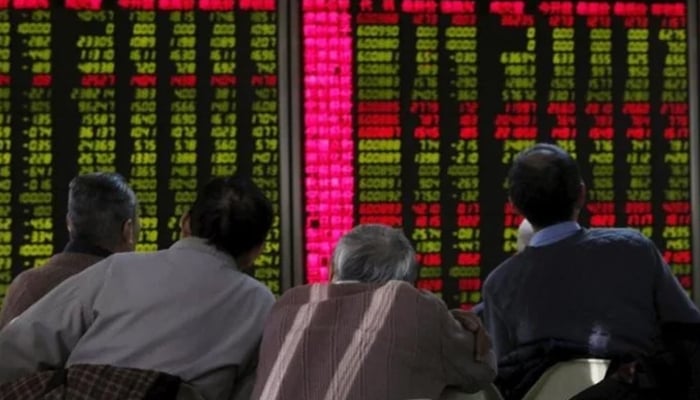KSE-100 index gains over 1,000 points
Analyst says PKR devaluation helped clear the uncertainty over the IMF's loan programme
Stocks skyrocketed Thursday after the rupee fell 9.6% against the dollar — the largest single-day fall in over 20 years — a strategically critical development that may help unlock the International Monetary Fund’s (IMF) deadlocked lending to Pakistan.
Pakistan Stock Exchange's benchmark KSE-100 Shares Index secured a massive 1,061.63 points or 2.67% to close at 40,846.53 points.
Commenting on the development, Arif Habib Limited's (AHL) Head of Research Tahir Abbas said that the rupee's steep fall has triggered a positive sentiment in the market.
"The driving factor is the rupee's market-based exchange rate. This has helped clear the uncertainty that was surrounding the investors," Abbas told Geo.tv.
The analyst said that the government's steps are helping the market recover and increasing the confidence of the investors — who were in a difficult position due to the uncertainty over the IMF programme's revival.
Abbas added that the mini-budget is also expected within the next eight to 10 days, the tariffs of gas and electricity might also witness an increase and more taxes would be imposed — also the global money lender's conditions.
The AHL in a post-market note said the market resumed the trading session on a positive note and processed to make an intraday high of 1209.79 points after the government took positive measures to meet IMF prerequisites before the resumption of talks for the revival of the programme.
"The major confidence booster for the investors today proved to be the free float of exchange rate determined by the market as volumes soared up across the board," the report said.
Sectors contributing to the performance included danks (+353.9pts), fertiliser (+230.1pts), cement (+100.4pts), miscellaneous (+81.4pts), and power (+46.7pts).
Volumes increased from 269.5 million shares to 364.1 million shares, up 35.1%, while the average traded value also increased by 23.8% to $56.7 million as against $45.8 million.
·Stocks that contributed significantly to the volumes are Cnergyico PK Limited, TPL Properties Limited, WorldCall Telecom Limited, DG Khan Cement Factory, and Maple Leaf Cement Factory.
The massive rupee depreciation came a day after foreign exchange companies removed a cap on the exchange rate, a key demand of the IMF as part of a programme of economic reforms it has agreed on with the cash-strapped South Asian nation.
The currency's official value closed at 255.4 rupees against the dollar versus 230.9 on Wednesday, the central bank said.
Facing an increasingly acute balance of payments crisis, Pakistan is desperate to secure external financing, with less than three weeks' worth of import cover in its foreign exchange reserves.
Pakistan secured a $6 billion IMF bailout in 2019. It was topped up with another $1 billion last year to help the country following devastating floods, but the IMF then suspended disbursements in November due to Pakistan's failure to make more progress on fiscal consolidation.
Aside from wanting the government to reduce its budget deficit, the IMF is pushing for it to move to a market-determined exchange rate regime.
The foreign exchange companies said on Wednesday that they had removed the cap for the sake of the country because it was causing "artificial" distortions for the economy.
Wednesday's move by foreign currency dealers, whose open market rates are different from the rate notified by the central bank, had a cascade effect on official exchange rates on Thursday.
British publication Financial Times Thursday warned that Pakistan’s economy was at risk of collapse with the government’s "failure to revive" an International Monetary Fund (IMF) deal.
According to the report, rolling blackouts and a severe foreign currency shortage are making it difficult for businesses to continue operations.
Shipping containers full of imports are piling up at ports as the buyers are unable to secure the dollars to pay for them, it added.
-
Global memory chip crunch puts spotlight on Apple; Will iPhone become more pricey?
-
Bitcoin plummets toward $60,000 as investors dump risky bets
-
Bitcoin crashes below $63K as regulatory pressure and market fears grow
-
Bitwise Crypto Industry innovators ETF: What investors should do in 2026?
-
Nintendo shares slide again as momentum fears grow
-
Gold, silver prices fallen sharply; What’s driving the drop?
-
Gold’s record climb: Experts question if its safety is ‘overstated’
-
Dubai unveils plans to construct street built with real gold












